![]()
The Words of the Cipriani Family
|
|
The Words of the Cipriani Family |
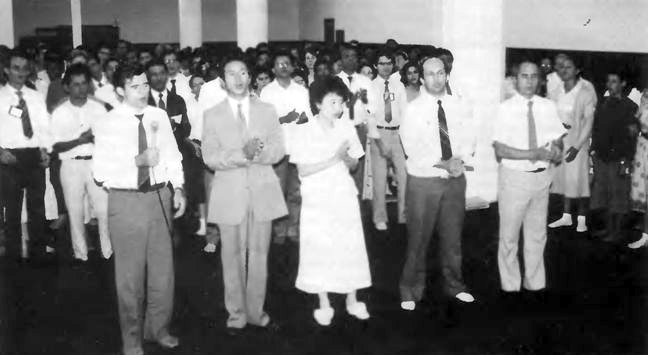
Brazilian
family members preparing for their confessions to [Black] Heung Jin
Nim held after this interview took place) in the church headquarters
in Sao Paulo. Front row, left to right: Waldir Cipriani, Rev. and
Mrs. Hyung Tae Kim, state leader Cesar Zaduski, and state leader
Mauricio Baldini.
Question: What do you feel are the reasons for the incredibly fast growth of the Unification Church in Brazil?
One of the main factors, I believe, is the example of Rev. Hyung Tae Kim -- the representative of True Parents in Brazil. He puts full emphasis on the learning and practice of the Principle. All members have to know the contents of each chapter and all about Father's life. Rev. Kim has taught us deeply about True Parents, about the suffering of the early disciples, and about his own experiences in the church. He is an example to us by always taking the initiative to do something before he asks us to accomplish anything. And, although he has to speak through an interpreter, this never stops him from continually teaching and guiding us.
Soon after I joined the Unification Church some years ago, I was sent out by Rev. Kim as a missionary.* This is another one of his traditions: As soon as members join the church, they attend a seven-day workshop, do a seven-day fast, and immediately go out as pioneers all over the country.
Another factor is that Rev. Kim often meets with True Parents in Korea or the United States. Thus he learns first-hand about the current developments in our movement, and he always tries to apply Father's ideas in Brazil. For example, when Father spoke about home church in 1979, Rev. Kim immediately encouraged all members to do home church in Brazil.
Love for True Parents and the Principle and the immediate practice of every new providential direction initiated by Father are the heart behind the growth of the Brazilian church. We deeply believe that it's not enough to proclaim that he is the Messiah, or just to believe that by faith in him we are saved. The belief is embedded in us that, especially after receiving the Blessing, we have to become the incarnation of the words and heart of True Parents. Through home church work and a public mission we will be able to grow towards that maturity.
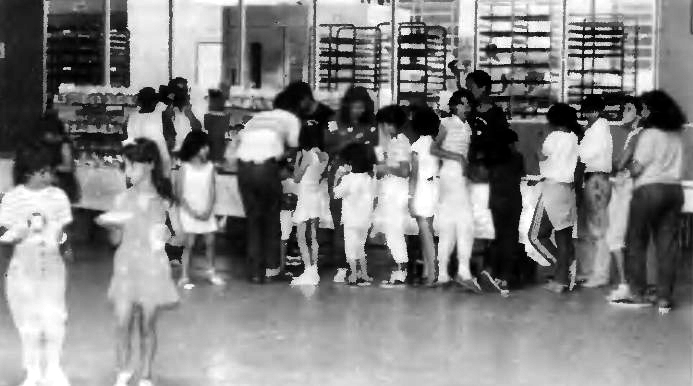
In
one of the bakeries in Sao Paulo, AMASA members distribute free
lunches to children.
Question: Could you describe how you are doing home church?
All members, including leaders, must regularly visit their 360 homes. If I myself didn't do this, I would have no foundation to ask the members to visit theirs. Home church is our main focus in Brazil. Our bread- baking approach started when the pastor* of the church center in Porto Alegre, capital of Rio Grande do Sul, became inspired by the idea of baking homemade bread, as his mother used to do. He bought a small oven so that his members could start baking bread and delivering it to their home church areas. Rev. Kim got so excited by the results that he reported the project to Father. Father responded that investing in bakeries in Brazil was an excellent idea and added that such an approach could help not only Brazil but all of Latin America and the Third World in general.
Some states don't have bakeries yet, so the more successful states are helping them to install small ovens and develop from this.
Now many blessed couples are moving into their areas, and their homes are becoming small Unification Church centers. We are encouraging members to buy projectors and to use them in their areas to give slide shows of Principle lectures.
In addition to our home church work, some members also teach at our Seminary; others work in various businesses. Members have started a clothing factory, several stores, a construction company, a travel agency, bakeries, and several other businesses. There are about 1,000 core members and home members in Brazil, including 24 blessed children. About 20,000 people around the country are sympathetic to the Principle, and about 50,000 have responded positively to many of the other projects of our movement.
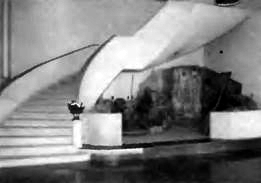
The
newly-restored stairway in the main lobby of the national
headquarters building.
Question: Have you had any success with video centers in Brazil?
When we heard that the Japanese family was having a lot of success with video centers, Rev. Kim sent me and another member to the United States to learn all about video centers and to record Principle lectures in Portuguese on video cassettes. Because Brazil is such a big country, the video cassettes promoted much more uniformity in the education of members. The members started using the model of the videotaped lectures to give their own workshops as well.
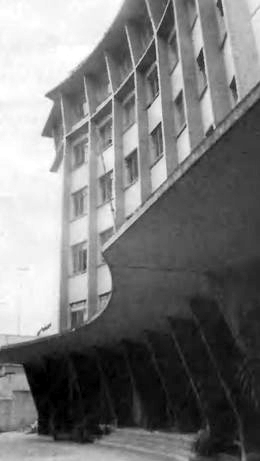
Main
entrance to the national headquarters building in Sao Paulo, Brazil,
a former scientific laboratory now undergoing complete restoration.
Question: Do you have any specific witnessing program?
For us, witnessing is an extension of home church. I always encourage members to witness wherever they are -- on the streets, when traveling, and to parents and relatives. Rev. Won Pil Kim stresses that while everyone should have his or her own 360 homes, we should also use every opportunity to witness. Witnessing is part of our training course at workshops. And at the Seminary one of the required courses is pastoral theology, which requires witnessing activity as a means to learn how to counsel people.
During the last two years we have also emphasized the importance of contacting and praying for our parents, relatives, and friends. In the past, many families have gotten very upset because their children joined. So we are making an effort to let our relatives know why we joined and what we are doing. This is making a substantial, positive change in the attitude of many members' families.
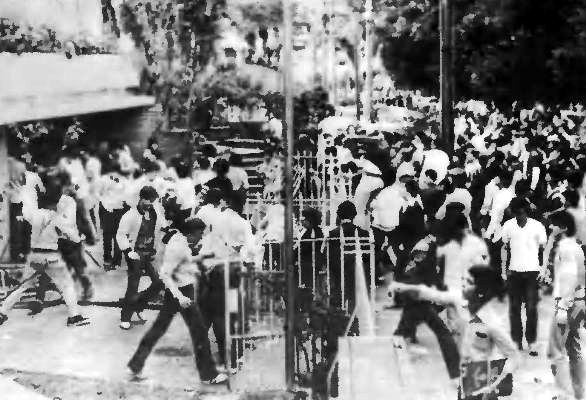
Youths
attack one of the church centers in Brazil during the "great
persecution" of 1981.
Question: In 1981, the whole Brazilian family experienced a wave of violent persecution. Briefly, what happened and what was the cause of it?
I believe that the persecution was the result of many failures, internal and external, on both national and international levels. For example, once I was called by a sister to help keep a member who was very upset from hitting Rev. Kim. I started to cry and I couldn't stop for 10 minutes because I felt that attacking the representative of True Parents was like hitting True Parents themselves. I believe that this occurrence became the basis for the church to be attacked later on.
Of course, there were also external factors. A lot of negativity was generated from within the progressive segment of the Catholic Church. About three percent of our members were once Catholic seminarians, including myself. My superior at the Catholic seminary spread many false stories about our church, saying that Rev. Moon was pulling members away from the Catholic Church. Negativity also thrived in the clandestine communist groups in Brazil. And of course the establishment, the government authorities, and the other churches, as well as families who were worried about losing their children, were all against us. Combined with the power of the media, especially the Globo Television Network, this led to the "great persecution." On its Sunday night program "Fantastico" -- which has one of the largest audiences in Brazil -- Globo slandered our movement four Sundays in a row.
In the violence that erupted, 17 of our houses were pelted with rocks. Because our first headquarters and many of our centers were located near high schools, hundreds of students on their way home from school would join in the attack. We lost telephones and suffered other property damage. One of our sisters, a bookkeeper, sustained injuries when somebody set fire to the building where she was working. Since almost all of our centers were rented, we lost our leases. We had to repair everything again for the owners. After all this, many members dispersed, and a difficult time began for everyone.
We did not retaliate against the persecution at all even though there was nothing true about the things they were saying. Later, our good attitude when facing the persecution helped to improve public opinion about Father and the church.
Not long ago, I found out that a certain TV station planned to air an American-made movie about the Unification Church entitled "The Sect of the Fanatics." Before they did, I contacted the station and asked them to give me a few minutes to talk about our church and founder. I met with the director and showed him how he had been totally misinformed by people of malicious intent, and how irresponsible it would be to broadcast such a film. We shared about the true heart and motivation of Rev. Moon, and about the development of our international and national movement. That convinced him not to put the film on the air, and we never heard anything about it again. Since then, the activities of our movement have grown tremendously.
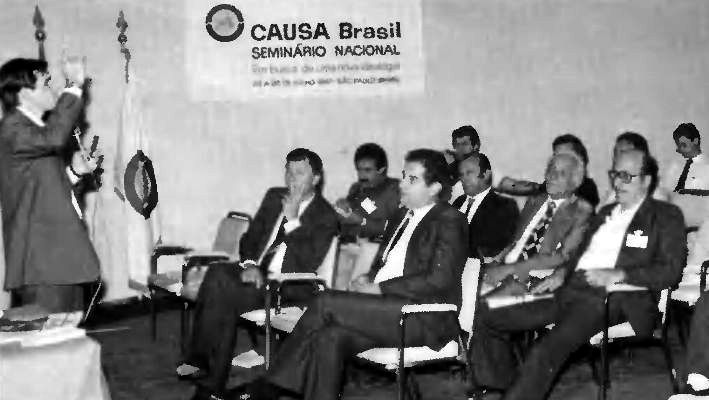
Participants
at a national CA USA seminar in Sao Paulo listen attentively to
Waldir Cipriani's lecture on "Searching for a New Ideology."
Question: Nowadays, what is the daily life and schedule of the core members of the church?
At the smaller centers the members generally wake up at 4:30 am; there is prayer at 5:00 and then they study the Principle. After that they clean, have breakfast, and leave for their respective missions. In the evenings, the centers organize Principle lectures and study sessions. At 10:30 pm there is a prayer service to close the day's activities. In big centers like Sao Paulo, most members get up between 3:30 am and 5:00 am to deliver bread to their home church areas. Members who get up very early usually take a short rest before they continue with their daily schedule. Some of our members are students at the Seminary in the evening, so they have to take a bus that leaves from the headquarters at 6:00 pm. The younger members do not follow such a strict schedule.
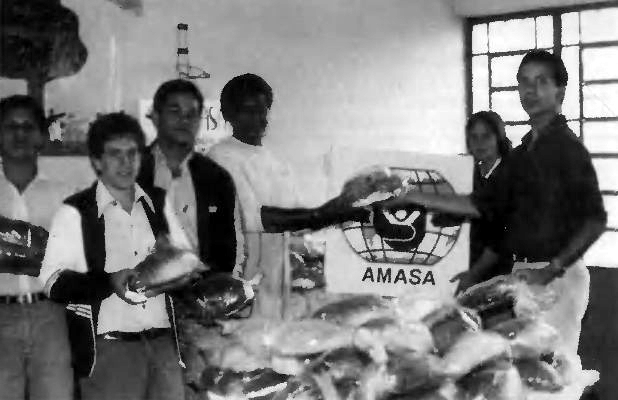
Members
of AMASA (World Association for Service and Friendship) prepare to
distribute loaves of bread to a needy area.
Question: Who are the students and the professors at the Seminary?
Currently, all the students are members of the Unification Church, with one exception -- a sergeant of the military police. At the moment there are 80 students enrolled. For the first two years, students take courses on theory. The third year is for field work. The students become assistants to pastors of different churches or work in other church projects in Sao Paulo. They also must present a thesis before they graduate.
We have 14 professors at the Seminary, from both outside and inside our church. Presently we are working to have the government accredit our Philosophy School program at the college level and we are working very seriously to fulfill all the demands for accreditation.
Question: Have you had any experience with True Parents personally?
Although I've always been geographically far away from them, I feel deeply grateful for Father's words. The quality of spiritual life we receive from True Parents is fascinating to me. During my 120-day training in New York, I was able to witness how True Parents are the real incarnation of the Principle. It's because of my internal unity with True Parents that I can keep up with all the activities that need to be done and maintain my spiritual life. Without this internal connection it would be very hard to carry on and give life to the members. We need a bridge to revitalize ourselves spiritually.
About two weeks ago I dreamed I was walking and holding hands with True Father and he was explaining to me what I should know and do. I felt that he was truly my Father. This kind of experience captivates me completely!
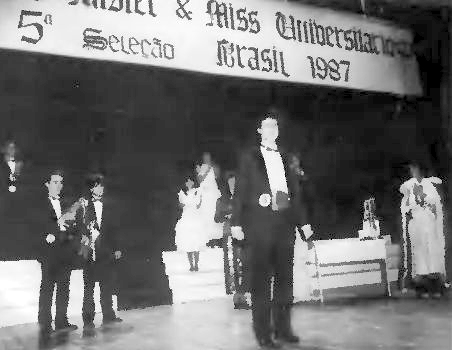
Contestants
at CARP's 5th annual Mr. and Miss University Contest, held in Sao
Paulo.
Question: What do you feel is the future of the Brazilian church?
I'm more and more convinced that the future of the Brazilian church is home church. I believe that the future students of our Seminary will come from home church. Since we started organizing Principle and CAUSA seminars for our home church guests, many people have been coming. We have excellent speakers at these seminars. Recently one pastor brought two full busloads of people for a two-day seminar in Curitiba. Our members feel inspired to invite guests from their home church areas, because these people are the fruits of their investment. Thus members can experience a real step-by-step restoration of themselves.
I am developing a serious plan for next year in terms of witnessing. I want to enlarge the number of core members. I foresee that the Unification Church in Brazil is going to grow a lot next year.
One limitation we experience is our members' inadequacy in speaking English and Korean, although we have both languages in our curriculum at the Seminary. One of our members is in South Korea studying the history of Korea, and other members are currently in the United States studying English. When they come back they will become pastors. I believe that in the future, in order for members to become pastors, they will need to be victorious in their spiritual life, be blessed, and speak English.
Within Brazil, from region to region there is a big difference in the quality of the education in the public schools, resulting in a wide variation of cultural and intellectual standards. Through our IOWC and other activities, and the exchange of members among states and regions, our church is helping to diminish these cultural differences.
We celebrate the 12th anniversary of the Brazilian church on November 23, 1987. We feel happy, and this happiness comes from a solid foundation of good results based on hard work and sacrifice. Rev. Kwak has said that in the future he would like to have a meeting of missionaries from all over the world take place in Brazil. This prospect gives me great joy. The headquarters building we bought and are restoring is definitely appropriate for such a large event. We also plan to send members trained in our bakeries to other countries in Latin America and Africa to start businesses and to develop home church activities there. It would be very meaningful for us to be able to offer Brazil to True Parents in this way for the sake of the world.
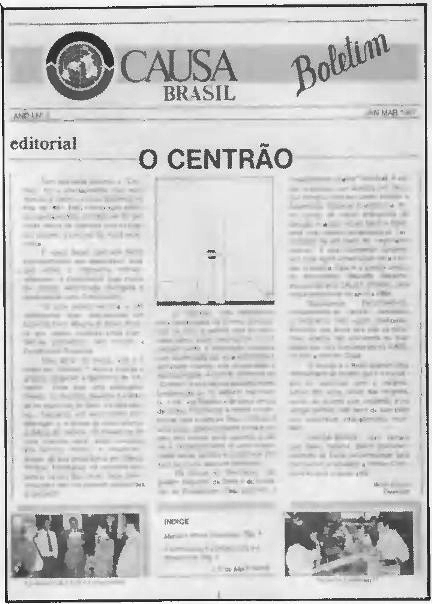
CAUSA-Brazil
newsletter.
CAUSA was introduced in Brazil in 1981, the year of the "great persecution." Gradually, important leaders such as ambassadors, congressmen, and others came to be involved. God could really bless the development of this activity, and by 1985, when the Pan American Convention of CAUSA was held in Sao Paulo, CAUSA already had a strong foundation in Brazil.
Over the years a wide variety of leaders and professional people have come to our CAUSA conferences -- ambassadors, congressmen, religious leaders, engineers, physicians, lawyers, businessmen, and other interested people. In the state of Pernambuco I recently gathered 15 evangelical pastors for a CAUSA conference. CAUSA brings together people that otherwise would fight each other like cats and dogs!
Recently three congressmen came to a CAUSA seminar in Uruguay. Since then, they have become our friends and have worked with us in many different activities. We have been invited by several heads of university departments to speak on various campuses. Already I've given talks at PUC Catholic University, Tuiuti University, Federal University of the State of Parana, and Computer College.
It is my impression that CAUSA has brought something special to Brazil. Brazilian people don't like either rightist or leftist regimes. Brazilians listen to everyone, but usually they follow their own convictions. In this sense CAUSA has "head wing" spirit attracts them. CAUSA appeals to the aspirations of many Brazilians, because it doesn't ask them to give up their own religion. People who come to CAUSA tend to develop quite a liking for Rev. Moon.
Brazilian people are religious; their background is Catholicism. Today they are very much in search of a true ideology. At the same time they want to be connected with the whole world. CAUSA, through Godism, opens the way for them. I have an example in my family: Recently my physical brother heard the CAUSA message, and soon afterwards he became the CAUSA leader in his city! CAUSA is definitely contributing to the growth of the Brazilian movement.
Marcia Aires works at the Cultural Department of the Unification Church in Brazil.
When the Brazilian Family heard that Father- had spoken these words about Brazil in a speech he gave in New York, we were truly amazed:
There is already a solid home church
foundation in Brazil. I introduced the home church providence there
several years ago, and I encouraged them to do some kind of service
project. In all 24 states, bread factories were established. Every
morning from four o'clock on, tons of bread are baked. All
Unification members in Brazil, from the leaders on down, hand carry
and distribute the bread through each district. That's the way they
do home church. Not only do they feed them bread -- Jesus said you
cannot live bread alone -- but they give them truth too, and true
love. This is how Brazil has become the most successful home church
country.
The Ideal Home Church
Dec. 21, 1986
These words challenged us to further increase our level of commitment and responsibility before God, True Parents, Rev. Hyung Tae Kim -- our regional leader -- and even our ancestors, for our work was still in its beginnings at that time, considering the nation as a whole. Today, it is already possible to pick the first blooming flowers of success in our home church areas.
Rev. Kim introduced the concept of home church to us in 1979. One state leader, Elias de Almeida, was the first person in Brazil to begin to do home church. He started to witness to the people in his area and teach them Principle lectures. Later some of us began delivering eggs door to door and witnessing at the same time. But the eggs turned out to be too fragile and heavy to carry, so we started a distribution food market using vans. Our results didn't at all approach our goals, but we grew in experience.
In 1981, the idea for the baking and distribution of bread began with the mother of the state leader in Rio Grande do Sul, Mrs. Alda Zaduski, who used to bake bread for her own family! Her son Cesar Zaduski, inspired by her work, arranged to acquire a small oven so that his members could bake and sell bread on the weekends. That was, in fact, a landmark in the home church providence. Rev. Kim insisted on developing that idea so that the members would have a new focus. He acquired bakeries in a few more states, and soon we were delivering bread to families daily.
To be honest, most of the members didn't like the idea at first. In fact, as much as Rev. Kim was enthusiastic about the idea, we were resistant to it.
But Rev. Kim always stressed that there was no room for slow, inconsistent behavior in one's area. He said the key to doing home church is to humbly serve and serve. He told us that doing home church helps us develop our creativity as we discover new ways to improve our areas, together with the families we come to know. Through our humility and unselfish service we can touch people's hearts, and eventually we'll come to be true parents in our areas.
However, many members were afraid of going to their areas. The great majority didn't yet know how to give Principle lectures. Bread made things a lot easier. It is always difficult to capture the hearts of people, but with our bread deliveries we had a good way to serve the people every day.
Rev. Kim is deeply committed to the success of home church in Brazil and is very happy to be able to report our progress to True Parents. Moreover, through his encouraging all of us to participate, we also began to feel personally responsible for the success of home church.
Now the program that we follow is very clear. As soon as a missionary settles down in a chosen city, he or she establishes a 360-home area, rents a house, and then begins bread deliveries. Eventually each leader receives a Principle slide program so that witnessing will be easier.
By living directly in our area and consistently following this method, we most certainly will be able to effectively reach out to our 360 families.
* "Missionary" is the Brazilian family's term for city leader, and "pastor" is the term for state leader.